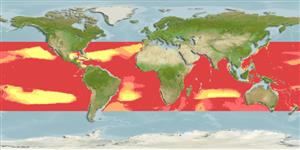>
Lophiiformes (Anglerfishes) >
Centrophrynidae (Prickly Seadevils)
Etymology: Centrophryne: Greek, kentron and Latin, centrum = prickle or spine (in addition to the midpoint of a circle ) + Greek, phryne = toad, prickly toad (Ref. 86949).
More on authors: Regan & Trewavas.
Environment: milieu / climate zone / depth range / distribution range
นิเวศวิทยา
เกี่ยวกับทะเล,น้ำเค็ม สัตว์ผิวน้ำในเขตน้ำลึก; ระดับความลึก 590 - 2325 m (Ref. 86949). Deep-water; 40°N - 43°S, 180°W - 180°E
Tropical and subtropical parts of all oceans. Eastern Atlantic: single record at 18°58'S, 10°14'W. North-eastern Atlantic: single record at 30°45'N, 14°30'W.
ขนาด / น้ำหนัก / Age
Maturity: Lm ? range ? - ? cm
Max length : 1.3 cm SL เพศผู้/กระเทย; (Ref. 86949); 24.7 cm SL (female)
Short description
เครื่องมือที่ใช้ในการแยกชนิดสัตว์,สิ่งมีชีวิตออกจากกัน | สัณฐานวิทยา | ความยาวต่างๆ
ก้านครีบอ่อนที่หาง (รวม) : 6 - 7; ก้านครีบอ่อนที่ก้น: 5 - 6. Distinguishing characteristics: larvae and juvenile with small digitiform hyoid barbel. Metamorphosed females: with single oval-shaped ovary; presence of supraethamoid; frontals are narrowly separated by cartilage along dorsal midline, each without ventromedial extension; presence of parietals, pterosphenoids, metapterygoids and mesopterygoids; absence of sphenotic spines; hyomandibula with double head; 2 hypohyals and 6(2+4) branchiostegal rays; bifurcated opercle; dorsal fork, short and less than 50% the length of ventral fork; long and slender subopercle with slender tapering upper end; well developed spine on anterior margin of lower end of subopercle; quadrate and articular spines present but minute; absence of angular and preopercular spines; jaws equal anteriorly, lower jaw with well-developed symphysial spine; absence of postmaxillary process of premaxilla; long and well developed anterior-maxillomandibular ligament; first pharyngobranchial present and suspensory in function; well-developed and toothed second and third pharyngobranchial; fourth pharyngobranchial absent; well ossified first, second and third hypobranchials, single ossified basibranchial; first epibranchial and all four ceratobranchials with teeth present; epurals absent; hypural plate deeply notched posteriorly; pterygiophore of illicium bears small ossified remnant of second cephalic spine; escal bulb contains central lumen with an escal pore leading to the exterior; tooth like denticles absent in esca; absence of posteroventral process of coracoid; presence of four pectoral radials, fusing to 3 in specimens greater than 150mm; pelvic bones present, slightly expanded distally; caudal rays 9 (2 simple+4 bifurcated+3 simple); numerous , close-set dermal spinules covering skin; pyloric caeca absent. Males: short hyoid barbel behind symphysis of lower jaw; small eyes, each without an aphakic space; relatively large olfactory organs; triangular shape of upper denticular plate, bearing a transverse series of 3 well-developed hooked denticles; crescent shaped lower denticular plate bearing transverse series of 4 strong, symmetrically placed denticles, fused at base; skin is naked, absence of dermal spinules. Larvae: short and deep; moderately inflated skin; short, digitiform hyoid barbel; moderate size of pectoral fins, not reaching base of dorsal and anal fins; pelvic fins absent (Ref. 086949).
Also mesopelagic. Males dwarfed, non-parasitic (Ref. 4493). 25 records from all oceans (Ref. 36124).
Life cycle and mating behavior
Maturities | การสืบพันธุ์ | Spawnings | Egg(s) | Fecundities | ตัวอ่อน
Bertelsen, E., 1990. Centrophrynidae. p. 509. In J.C. Quero, J.C. Hureau, C. Karrer, A. Post and L. Saldanha (eds.) Check-list of the fishes of the eastern tropical Atlantic (CLOFETA). JNICT, Lisbon; SEI, Paris; and UNESCO, Paris. Vol. 1. (Ref. 4493)
IUCN Red List Status (Ref. 130435)
Threat to humans
Harmless
Human uses
เครื่องมือ
Special reports
Download XML
แหล่งที่มาจากอินเตอร์เน็ต
Estimates based on models
Preferred temperature (Ref.
123201): 3.5 - 6.9, mean 4.7 °C (based on 976 cells).
Phylogenetic diversity index (Ref.
82804): PD
50 = 1.5000 [Uniqueness, from 0.5 = low to 2.0 = high].
Bayesian length-weight: a=0.01000 (0.00244 - 0.04107), b=3.04 (2.81 - 3.27), in cm total length, based on all LWR estimates for this body shape (Ref.
93245).
ระดับชั้นอาหาร (Ref.
69278): 4.1 ±0.7 se; based on size and trophs of closest relatives
Fishing Vulnerability (Ref.
59153): Low vulnerability (20 of 100).
